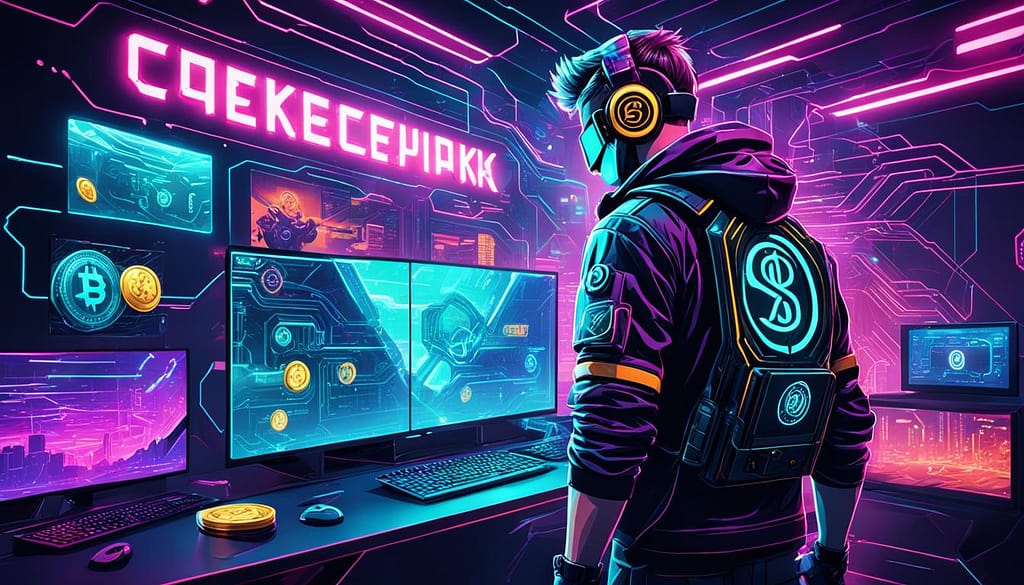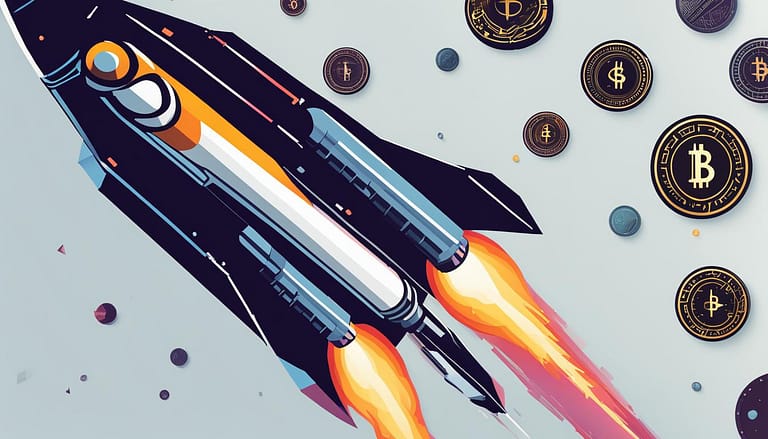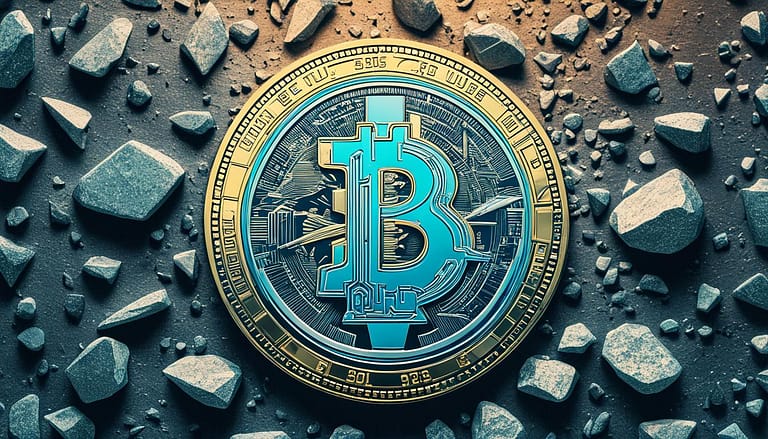The Intersection of Gaming and Cryptocurrency
The digital landscape is rapidly evolving, with the integration of Cryptocurrency and Gaming marking a revolutionary chapter for both sectors. As gamers delve into virtual worlds replete with complex economies, the Blockchain Technology in Gaming heralds a new era of financial interaction and gaming pleasure. This seamless fusion has turned what was once a pastime into a domain ripe for economic engagement. By leveraging the power of Virtual Currency for Gamers, the industry not only enhances the gamer experience but also adds a financial nuance to the very act of play.
The use of blockchain adds an unprecedented layer of security, granting gamers and developers alike a transparent and immutable system for managing transactions and assets. This digital alchemy, which combines the flexible economies of gaming with the novel technologies of cryptocurrency, has positioned the Cryptocurrency in Gaming Industry at the forefront of industrial innovation. However, the path ahead is lined with challenges, including the inherent volatility of cryptocurrencies and the evolving landscape of regulatory frameworks.
Key Takeaways
- Incorporating cryptocurrency fosters direct transactions and unique monetization in gaming.
- Blockchain’s security features instill trust and fairness within the gaming community.
- Tokenization of in-game assets via NFTs allows for verifiable ownership and tradability.
- Despite its potential, the industry must navigate through volatility and regulatory challenges.
- Innovations continue to drive user-friendly and sustainable solutions in gaming ecosystems.
Exploring the Convergence of Cryptocurrency and Gaming
As the digital landscape evolves, the gaming industry is experiencing a groundbreaking transformation through the emergence of cryptocurrency. The symbiosis of blockchain technology and interactive entertainment is creating new paradigms of gaming economies—ones that are built on the tenets of speed, security, and true digital ownership.
The Rise of Crypto in the Gaming Industry
The adoption of crypto games has redefined the role of currency in the virtual sphere. Gaming with cryptocurrency is not just about exchanging value; it’s a fundamental shift towards giving players and developers more control and flexibility. This shift is characterized by the seamless integration of cryptocurrencies within games, creating ecosystems that extend beyond mere entertainment into realms of digital investments and rewards.
Advantages of Using Cryptocurrency for Gamers and Developers
One of the most significant advantages presented by cryptocurrency in the gaming sector is the empowerment of users through crypto rewards in games. Developers are leveraging these rewards to entice and retain players by aligning in-game achievements with tangible, real-world value. Gaming platforms augmented with blockchain technology are also witnessing a surge in participatory governance, furnishing players with a voice and a hand in the platform’s direction, thanks to the decentralization of gaming economies. In essence, NFT gaming is championing digital ownership, which unlocks a marketplace where virtual items are more than pixels—they are investable assets.
While the integration of digital currencies into games introduces numerous opportunities, it also brings potential challenges that must be carefully managed. Online security is paramount, as gaming platforms become increasingly attractive targets for cyber threats. Furthermore, the regulatory environment surrounding the use of cryptocurrency in gaming is still evolving, requiting a proactive approach to compliance and education.
In conclusion, the blend of gaming with cryptocurrency is not just reshaping the playing field; it is driving the future of digital economies. As this space continues to mature, it is clear that both gamers and developers stand to gain immensely from this convergence.
Cryptocurrency and Gaming: A Match Made in Digital Heaven
The fusion of Cryptocurrency and Gaming has unleashed a new paradigm for players and developers alike. The dynamic amalgamation of these two spheres ushers in a realm where Virtual Currency for Gamers is not just about buying power-ups or exclusive items; it’s about taking part in a digital economy where every action can potentially yield real-world value. The rise of Crypto Games emphasizes a novel monetization strategy that benefits the entire gaming community, offering more than just surface-level experiences.
Bitcoin and other cryptocurrencies have introduced a distinct layer to gaming, proposing new methods of value transfer. This seamless integration enables the purchase, sale, and trade of in-game assets, transforming them from mere virtual commodities into valuable digital property. This virtual market has become a beacon for an innovative gaming experience, putting the spotlight on Bitcoin Gaming as not just a trend, but a sustainable aspect of the digital entertainment industry.
| Gaming Aspect | Traditional Currency | Cryptocurrency Impact |
|---|---|---|
| Transaction Speed | Varies with payment methods | Instantaneous and borderless transactions |
| Ownership | Limited to in-game environment | True ownership with trading potential outside the game |
| Monetization | Primarily in-game purchases and advertisements | Diverse models including play-to-earn and NFTs |
| Economic Models | Centralized control by developers | Decentralized and player-driven economies |
| Accessibility | Geographically and financially restrictive | Inclusive, with the potential to engage unbanked populations |
The advent of play-to-earn models has not only magnified the appeal of Crypto Games but has also crafted an entire ecosystem wherein the currency employed holds more than mere in-game value.
“Crypto Games are more than entertainment; they are a digital asset platform, an investment opportunity, and a community,”
describes the new era of gaming where every login could lead to financial upliftment.
- Play-to-Earn Model: A transformative approach where player engagement leads to actual earnings.
- In-Game Economies: Cryptocurrency enables complex economies, mirroring real-world trading and investment.
- Community Governance: Players are not just participants but have a say in the game’s direction and economy.
- NFT Marketplace: Creates a vibrant marketplace for in-game assets, backed by blockchain technology.
In essence, the intersection of Cryptocurrency and Gaming has not just created a novel form of entertainment but has also fostered a robust virtual economy. Gamers worldwide are now part of an inclusive, borderless, and potentially lucrative digital realm where every move is an investment in their virtual—and potentially real—futures.
The Role of Blockchain in Revolutionizing Gaming Platforms
The infusion of Blockchain Technology in Gaming is radically altering the landscape, delivering new standards in security, transparency, and player agency. As a foundational technology for cryptocurrencies, blockchain facilitates not just transactions with in-game digital currencies but also fortifies the gaming realms against fraudulent activities.
Enhancing Security and Trust with Blockchain
Security is paramount in online interactions, and this holds especially true within the gaming industry. Blockchain introduces an immutable record of transactions and actions, which fosters a relationship of trust between game developers and the player community. Games integrated with blockchain allow for Gaming with Cryptocurrency while assuring players that their assets and progress are secured against tampering and hacking efforts. This security is not only about protecting digital assets but also about safeguarding personal information – a pressing concern in online spaces today.
Decentralization of Gaming Economies
The concept of decentralized gaming economies has been gaining traction, thanks to the emergence of Decentralized Autonomous Organizations in Gaming. DAOs empower players, giving them a voice in the governance and future direction of the games they love. Crypto rewards in games serve as an incentive, engaging players in a deeper, more meaningful way than traditional gaming models.
Moreover, the platforms built on blockchain technology enable a transparent and fair ecosystem where the value generated directly benefits the players, developers, and stakeholders, aligning profits with participation and contribution. These profound changes signify blockchain’s potential to not only innovate games but redefine them as collaborative and dynamic economies.
Virtual Currency for Gamers: Changing the Face of In-Game Transactions
The landscape of the gaming industry is undergoing a dramatic transformation with the introduction of Virtual Currency for Gamers. This new economy is influencing in-game transactions in an unprecedented way, opening up the sphere of gaming to a future where players are both consumers and key financial players within the gaming world. Virtual currencies are breaking down barriers, creating a seamless transaction flow, and empowering gamers with the ability to earn Cryptocurrency Rewards in Games.
Gamers are steadily evolving into savvy economic agents, not solely through the consumption of digital content but also by actively participating in the in-game economy. As such, the gaming experience is being enriched through Gaming with Cryptocurrency. This development goes beyond the traditional aspects of gaming, venturing into a realm where financial investment becomes part and parcel of the digital adventure.
One of the most revolutionary aspects of this movement is the integration of NFT Gaming, where non-fungible tokens (NFTs) offer authenticity and vested ownership of in-game assets. It is a development that firmly establishes virtual currencies not just as a medium of exchange within the digital universe but also as a store of value in the real world. Players now have the potential to accrue real-time rewards and earnings, which may appreciate over time, based on market dynamics and demand.
The digital gaming world is forging a path where virtual currency is as pivotal as the gameplay itself, transforming every gamer into an active economic participant.
Garnering financial returns from gameplay blurs the boundary between gaming enjoyment and economic gains. This interplay between gaming and cryptocurrency is not a transient trend, but a cornerstone of the digital entertainment’s future. Following this trajectory, the integration of virtual currencies into gaming is poised to become a norm, rather than an exception.
- Virtual currencies facilitate quick and secure transactions within games.
- Gamers can earn cryptocurrency rewards, creating a new type of in-game incentive.
- NFTs provide ownership of unique in-game items, adding a tangible value to gaming achievements.
In conclusion, the foray into virtual currency within the gaming world heralds a new age of digital transactions, where gamers take on the roles of players, investors, and stakeholders. It is an age characterized by secure, frictionless in-game purchases and trades, bolstered by the possibility of economic returns through innovative gameplay.
Monetization Strategies: How Crypto Rewards Benefit Players
The integration of Cryptocurrency and Gaming is not just a trend but a strategic shift that has led to the creation of novel monetization methods. By leveraging the unique aspects of Crypto Rewards in Games, the gaming industry is witnessing the emergence of value-driven gameplay, making Gaming with Cryptocurrency an appealing proposition for both players and developers.
New Revenue Models in Gaming with Cryptocurrency
Traditional gaming revenue streams are rapidly being complemented—and in some cases, replaced—by the advent of blockchain-driven financial models. These new approaches provide gamers with an option to earn cryptocurrency rewards, blurring the lines between leisure and income. The use of Blockchain Technology in Gaming not only diversifies developer revenue but also incentivizes players to engage more deeply with gaming ecosystems.
The Impact of Crypto Rewards on Player Engagement
Player engagement is vital for the success of any game, and crypto rewards have proven to be a powerful tool in heightening this engagement. By offering tangible value for time spent in-game, players are encouraged to participate more actively and contribute to the in-game economy. This level of engagement is revolutionary, positioning cryptocurrency as an integral part of the gaming experience.
Here’s a comparative look at how cryptocurrency incentives have been transforming player engagement and opening new revenue channels:
| Aspect | Traditional Gaming | Gaming with Cryptocurrency |
|---|---|---|
| Revenue Stream | Advertising, In-game Purchases | Crypto Transactions, Asset Tokenization |
| Player Incentive | High Scores, Leaderboards | Real Economic Value, Tradable Assets |
| Engagement Model | Content Consumption | Content Creation and Ownership |
| Economic Model | Centralized, Publisher-Controlled | Decentralized, Player-Driven |
| Community Role | Passive Participants | Active Stakeholders |
The introduction of crypto rewards is not just an optional gimmick; it’s a strategic evolution that enriches player experience and opens up new economic frontiers within the realm of gaming.
The Advent of NFT Gaming: Collectibles Meet the Blockchain
The fusion of NFT Gaming and Blockchain Technology in Gaming represents an innovative leap, resulting in digital collectibles taking center stage in the gaming universe. Through the prominence of Cryptocurrency and Gaming, an expansive new arena of Crypto Rewards in Games has emerged, driving interest and investment like never before. NFTs, or Non-Fungible Tokens, are carving a name for themselves by transforming how virtual assets are owned and traded, marrying the real with the virtual in an unhitherto seen manner.
NFTs Revolutionizing Ownership and Trade of Virtual Assets
NFTs embody the epitome of digital ownership, ensuring that their holders have undeniable and exclusive rights over their virtual commodities. This Blockchain Technology in Gaming has facilitated a new standard of authenticity and value assessment in the virtual marketplaces, significantly amplifying the economic potential of virtual assets.
Examples of Successful NFT Games
Many NFT Games have not only succeeded in maintaining vibrant in-game economies, but they also stand as testament to the potential of this disruptive technology. Below is an insightful table that showcases some successful NFT games that mark milestones in this innovative landscape:
| Game | Blockchain Platform | Key Features | Community Engagement |
|---|---|---|---|
| Cryptokitties | Ethereum | Collectible breeding game | High |
| Decentraland | Ethereum | Virtual real estate | Expansive |
| Axie Infinity | Ethereum (Ronin sidechain) | Battle and breed fantasy creatures | Extensive |
| The Sandbox | Ethereum | User-generated content and game maker features | Robust |
NFT Gaming has undeniably become synonymous with the future of decentralized entertainment, heralding a new chapter in both digital economics and immersive play. These examples provide but a peek into the vast possibilities that await the realm of Cryptocurrency and Gaming, as it continues to challenge traditional gaming models, offering stakeholders not just entertainment, but a stake in the game’s success.
Incorporating Cryptocurrency in Gaming Industry Marketplaces
The integration of cryptocurrency in the gaming industry heralds a new paradigm for virtual economic exchanges. Crypto Games are leading the charge, introducing Virtual Currency for Gamers and revolutionizing the approach to in-game transactions. No longer confined to the conventional cash-for-content system, these platforms offer an enhanced layer of flexibility and financial autonomy, elevating the user’s gaming venture from a mere pastime to a potential profit opportunity.
In this digitally enabled marketplace, Bitcoin Gaming stands as a robust example of how cryptocurrency can streamline economic activities within virtual environments. Notably, the introduction of cryptocurrency in gaming industry marketplaces allows for real-time transactions, which are both swift and secure, making it increasingly attractive for gamers and developers alike.
In the table below, we examine how various cryptocurrencies are being leveraged across gaming platforms to enrich the player experience and evolve the economic landscape.
| Cryptocurrency | Platform | Utility | Player Benefits |
|---|---|---|---|
| Bitcoin | Online Casinos | Facilitating bets and payouts | Anonymity and security in transactions |
| Ethereum | NFT Gaming Platforms | Buying and trading NFTs | Authentic ownership of digital assets |
| Litecoin | Multiplayer RPGs | Microtransactions for in-game items | Low transaction fees and fast processing |
| XRP (Ripple) | Esports Betting Platforms | Prize pools and player rewards | Global reach with minimal transfer costs |
As evidenced by the data, cryptocurrencies are diversifying the economic opportunities within games, pushing the boundaries of traditional in-game marketplaces. By doing so, they are crafting a multifaceted environment where players can reap the rewards of their in-game success in tangible, real-world terms.
Critical to the success of implementing these virtual currencies is the development of secure and user-friendly infrastructure that upholds the integrity of transactions while preserving the exhilarating nature of the gaming experience. As the Cryptocurrency in Gaming Industry continues to evolve, these decentralized marketplace innovations signal a wave of growth that may very well dictate the future of gaming economy.
Gaming with Cryptocurrency: A User Experience Perspective
The fusion of gaming and cryptocurrency is crafting a more intuitive and engaging experience for users around the world. As digital currency becomes increasingly embedded within the gaming sector, it revolutionizes how players interact with virtual environments, purchase content, and receive rewards. Central to this transformation is the unmatched ease which digital currency transactions offer users—a change that is rapidly setting new standards for the industry.
The Ease of Seamless Transactions
Swift and secure payments are no longer a luxury but a necessity in today’s fast-paced gaming world. Crypto Games and platforms that harness the power of Virtual Currency for Gamers are leading the charge, offering an ease of transaction that is hard to match with traditional currencies. The transformative effect this has on a user’s experience cannot be overstated. The speed at which in-game currencies can now be exchanged or withdrawn to cryptocurrency creates a fluid economy, bridging the gap between virtual and real-world finance.
Attracting a New Breed of Gamers with Crypto Integration
By integrating Cryptocurrency Rewards in Games, the industry is witnessing the emergence of a diverse and inclusive community of players. Tech-savvy individuals who are already familiar with digital currencies are naturally gravitating towards gaming experiences that acknowledge and utilize their preferred mode of transaction. This inclusivity is paving the way for new gamers, who are keen on exploring the myriad benefits that come with the integration of cryptocurrency. From earning rewards to trading virtual assets, the integration of cryptocurrency is reshaping the gaming landscape and user expectations.
The potential benefits are clear: a more streamlined, secure, and modern gaming experience that resonates with a generation accustomed to the efficiency of digital innovation. As both new and established gamers alike are drawn to these advanced platforms, one can only expect this trend to continue its upward trajectory, further cementing the role of Cryptocurrency in Games.
Bitcoin Gaming: Riding the Wave of Cryptocurrency Popularity
The emergence of Bitcoin Gaming marks a significant milestone in the realm of digital entertainment, mirroring the meteoric rise of Bitcoin itself. As the original cryptocurrency, Bitcoin is synonymous with the revolutionary shift towards a virtual economy, extending its influence into the dynamic world of gaming. Players seeking both the thrill of competition and the allure of financial gain are increasingly drawn to the autonomy and universality that a Virtual Currency for Gamers provides.
Bitcoin’s immutable nature coupled with its widespread acceptance renders it the quintessential virtual currency for the evolving landscape of Crypto Games. Its adoption in gaming transcends traditional boundaries, creating a global stage where players across the world connect, compete, and transact without concern for exchange rates or international fees. The integration of Bitcoin in gaming serves not only as a testament to the adaptability and innovation within the industry but also highlights its commitment to player freedom and financial empowerment.
Cryptocurrency and Gaming are converging at an unprecedented pace. As a result, developers and stakeholders are keenly observing this synergy, considering how Bitcoin can underpin not just in-game transactions but also broader economic models within gaming. The cultural and monetary implications of this integration are vast, suggesting a future where the value of digital entertainment is redefined by the capabilities and assurance of cryptocurrency.
| Bitcoin Gaming Benefits | Traditional Gaming Limitations |
|---|---|
| Enhanced security and anonymity | Concerns over privacy and data breaches |
| Instantaneous, global transactions | Regional restrictions and payment delays |
| Decentralized and borderless access | Dependency on centralized authorities |
| Opportunities for monetization | Limited revenue channels for players |
As the vanguard of Virtual Currency for Gamers, Bitcoin is not just riding the wave of popularity; it’s reshaping the ocean of gaming possibilities. Gamers, developers, and investors continue to navigate this burgeoning domain, where each wave of innovation brings forth new horizons for entertainment, interaction, and monetary transaction.
Crypto Games: Challenges and Solutions for Mainstream Adoption
The burgeoning domain of crypto games presents an innovative nexus of blockchain technology and interactive entertainment. However, this progressive venture is not without its intricacies. Mainstream adoption of cryptocurrency within the gaming sphere is contingent upon overcoming the volatility inherent in digital currencies and navigating a complex regulatory landscape. Developers and stakeholders within this space are actively seeking viable solutions to these barriers.
Addressing the Volatility of Cryptocurrency Within Games
The penetration of blockchain technology in gaming introduces unique financial challenges, particularly the volatility of cryptocurrencies. This fluctuation can significantly affect in-game economies and players’ financial stakes. Progressive strategies being adopted include the integration of stablecoins and the establishment of in-game hedging mechanisms, both aiming to offer a more stable gaming economy. These solutions provide a buffer against market volatility, ensuring the sustainability of the in-game currency’s value.
Overcoming Regulatory Hurdles in Cryptocurrency Gaming
The dynamic field of crypto games frequently encounters regulatory hurdles, a consequence of the hybrid nature of gaming and financial innovation. To advance beyond these barriers and gain wider acceptance, the industry must prioritize the creation of accessible educational resources, which demystify the complexities of blockchain technology and cryptocurrency. Enhanced security measures and active lobbying for clearer, innovation-friendly regulations will ensure a balanced framework that protects both consumers and the integrity of this digital frontier.
| Challenge | Solution | Benefit |
|---|---|---|
| Volatility of Digital Currencies | Integrate Stablecoins | Enhanced Economic Stability |
| In-Game Hedging Mechanisms | Develop Risk Management Tools | Protected Player Investments |
| Regulatory Uncertainty | Educational Resources & Lobbying | Clearer Legal Framework |
| Need for Enhanced Security | Implement Advanced Security Protocols | Increased Trust in Crypto Gaming Platforms |
Redefining Digital Ownership: The Impact of Cryptocurrency on Game Assets
The realm of gaming is experiencing an unparalleled shift with the integration of cryptocurrency and gaming. Where once digital assets held sense for entertainment alone, they now embody tangible value, heralded by the fusion of cryptocurrency, blockchain, and gaming ecosystems. The pursuit of Digital Ownership in Gaming is not merely a concept, but a reality enabling players to own, sell, and trade their virtual gains with unprecedented legitimacy.
At the forefront of this transformation is NFT Gaming, which utilizes the power of Non-Fungible Tokens to authenticate individual ownership of digital items. NFTs serve as certifiable evidence that each game asset is unique and owned solely by the player. Not only do they validate digital ownership, but also provide a seamless way to transfer and sell these assets on various platforms and marketplaces.
The traditional view of in-game items as non-transferrable, ephemeral commodities is fading, making way for a new paradigm where the distinction between virtual and real economic value is dissolving. With Cryptocurrency in the Gaming Industry, purchasing a rare in-game weapon or cosmetic item moves beyond simple gameplay enhancement to a veritable investment. This shift is not only reshaping player expectations but also revitalizing the economics of games, leading to innovative development and marketing strategies.
“Cryptocurrency gives gaming economies a unique advantage—allowing gamers to take actual ownership of their in-game items and even earn a living through strategic play and trade.”
Consider the table below, which illustrates the contrast between traditional gaming assets and crypto-enabled gaming assets:
| Traditional Gaming Assets | Crypto-Enabled Gaming Assets |
|---|---|
| Limited to in-game use | Usable and tradeable on external platforms |
| No real-world value | Real-world valuation and potential for investment |
| Bound by game publishers’ terms | Ownership proven through blockchain |
| Subject to in-game inflation and depreciation | Value preserved, potentially appreciating outside the game |
| Prone to duplication and piracy | Unique and secured by NFT technology |
This emergent model of digital ownership elevates the status of the gamer, transforming them from a mere consumer to an investor and stakeholder in the gaming industry’s burgeoning economy. It is a profound advancement that not only stimulates long-term engagement but also solidifies the foundation for a robust, sustainable market within the industry. The advent of cryptocurrency in gaming is not just a fleeting fad but marks a significant evolution in how the world perceives and interacts with digital content.
Conclusion
As we stand at the crossroads of technological innovation, the interlocking of cryptocurrency and gaming is sculpting a new horizon for both realms. Far from being a transient fascination, the merger of these domains signifies a seismic shift towards redefined interactive experiences. The digital landscape is being broadened by game developers and financial technologists, working in concert to infuse games with decentralized economies and blockchain-backed assets. The transformative impact of these changes heralds a dynamic future, one bubbling with opportunities for growth, collaboration, and previously uncharted experiences within virtual worlds.
The Future of Cryptocurrency and Gaming: A Synergetic Growth
The trajectory of synergetic growth between the Future of Cryptocurrency and Gaming suggests a vast and fertile arena for innovation. This burgeoning synergy promises to catapult the possibilities of what it means to engage with virtual environments, going beyond sheer entertainment to fostering economies where each participant plays a pivotal role. Blockchain Technology in Gaming is not just adding layers of complexity; it’s building foundational structures that will support and sustain these fluid, ever-expanding virtual economies.
Final Thoughts on This Nexus of Virtual Economies
In light of the progression within the Cryptocurrency in Gaming Industry, it becomes evident that this alliance will yield unprecedented opportunities and challenges alike. The horizon glows with the prospect of a seamless fusion that values player engagement and rewards in ways that align with the decentralization ethos. Poised at the cutting edge of the Synergy in Virtual Economies, the gaming industry must navigate the waters of regulatory frameworks while fostering the growth potential inherent in this exciting enterprise. In the balance lies the potential for a recalibrated virtual experience, one that offers robust economic possibilities and heralds a new era of digital ownership and engagement.










